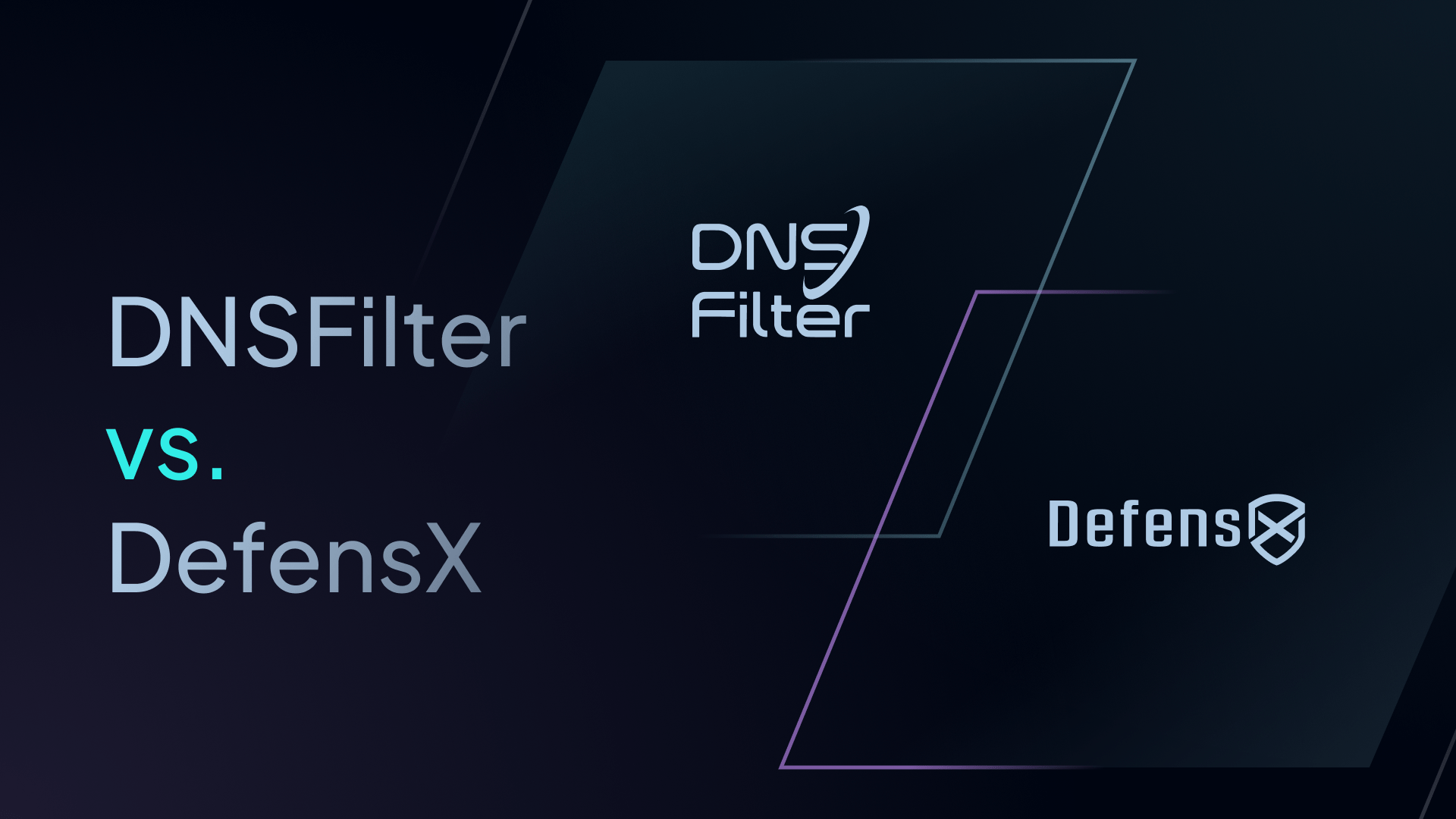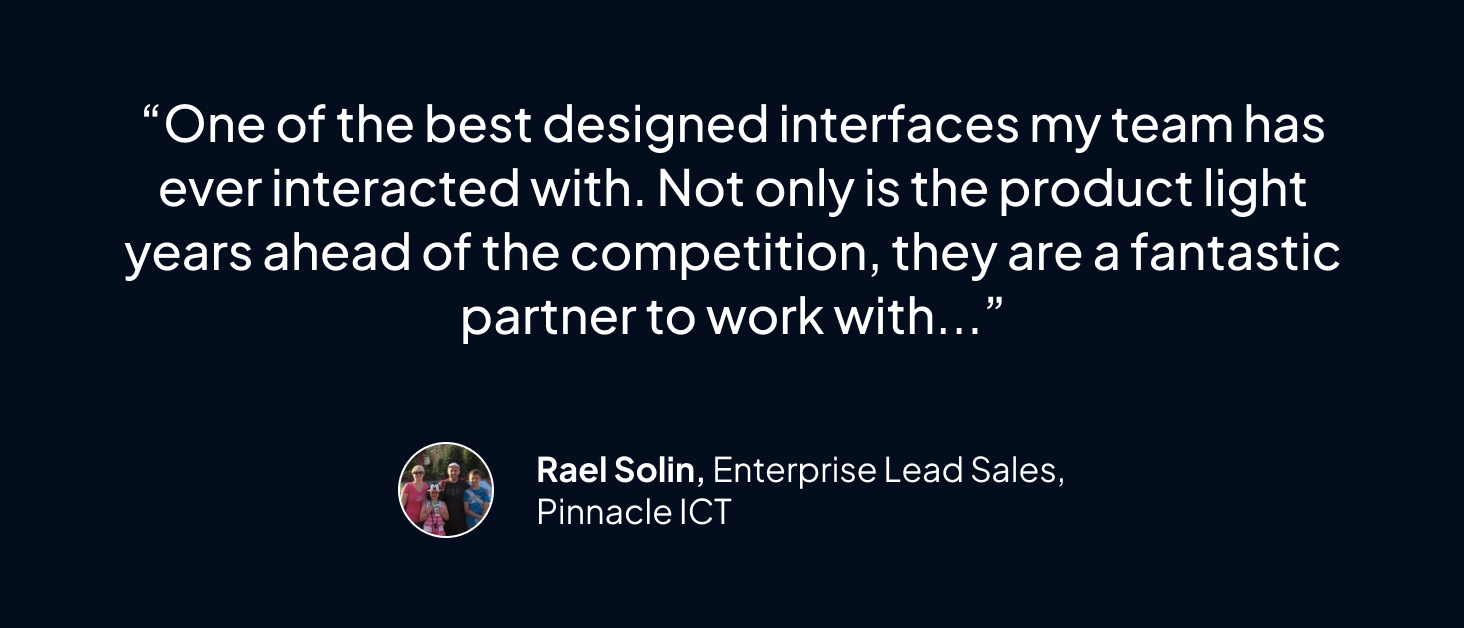DNSFilter vs. DefensX: What's the Better DNS Product?
We break down the key differences between both platforms and introduce a third option that's more feature-rich, customizable, and flexible.

The main difference between DNSFilter and DefensX is that DNSFilter focuses on AI-powered DNS threat protection for businesses, while DefensX offers broader secure web access features, including Zero Trust Network Access and Remote Browser Isolation.
If you're looking for a DNS security platform to protect your network from threats like malware, phishing, and shady websites, two names you might come across are DNSFilter and DefensX.
In this post, we’ll break down how they compare in terms of features, pricing, support, analytics, and more. And if you’re not 100% sold on either? Stick around to the end, where we show you why Control D might be a better fit for your business.
What are DNSFilter and DefensX?
DNSFilter is a cloud-based DNS security service that uses AI to block malicious websites, filter inappropriate content, and give you some visibility into internet usage. It’s built for speed and simplicity, making it appealing for businesses that want quick setup with decent protection.
DefensX is a newer player in the space, targeting MSPs exclusively. It offers browser-based protection that bundles DNS protection with a few other security tools.
Let’s compare the two in detail.
DNSFilter: Pros & Cons
Best for: Businesses that want AI-powered DNS filtering with fast query speeds.
Key Features
- Fast DNS resolution via a global Anycast network
- AI-powered threat detection
- Flexible content filtering with category and Service (app/tool) blocking
Pros
- Quick and easy to set up
- Clear pricing
- Works well for small-to-medium businesses
Cons
- Charges extra for things like SIEM integration and data exporting
- Only supports DNS-over-TLS (DoT)
- Lower uptime and server quality than expected
- Lack of advanced filtering features
Our Take on DNSFilter
DNSFilter is a solid choice for businesses looking for AI-powered security and quick DNS resolution – it’s one of the fastest in the industry, often competing with Cloudflare. But if you need more customization and advanced controls without having to pay for additional functionality, you may want to look elsewhere.
DefensX: Pros & Cons
Best for: Small to medium-sized MSPs looking for a browser-based DNS solution.
Key Features
- File Protection & Secure Web Browser for higher-tier plans
- Remote Browser Isolation & Zero Trust Network Access
- Real-time threat detection and malware filtering
Pros
- Easy to set up and deploy
- Protects against email and web-based threats
- Built-in secure browser
Cons
- Limited to MSPs
- Very little transparency around pricing
- Lacks depth in customization
- Slow product development cycle
Our Take on DefensX
DefensX is a reliable option for small to mid-sized MSPs looking for a browser-based DNS solution. It provides essential protection against malware and phishing threats. However, the lack of flexibility and customization in filtering policies and configurations make it less suited for complex use cases.
Another thing to note is their product development cycle. There are reports online suggesting that DefensX is slow to roll out new and important features, which could be a major drawback for those looking for the latest upgrades and functionality.
DNSFilter vs. DefensX
Plans & Pricing
DNSFilter has a straightforward pricing model with three plans:
- Basic – $1.15/user/month
- Pro – $2.30/user/month
- Enterprise – $3.00/user/month
Pricing also varies based on organization type:
- MSPs – minimum $150/month
- Educational Institutions – $4/student/year (125-user minimum)
- Public Wi-Fi Operators – $5/access point/month
DefensX offers three plans:
- Core – basic DNS filtering
- Core+ – adds secure browsing
- Premium – includes zero-trust security
However, pricing isn’t publicly listed; you’ll need to book a demo and consult with their sales team or purchase through an MSP partner like Pax8.
Features, Clients, and Integrations
As you can see, both platforms are fairly evenly matched, with both offering similar features. However, there are also some notable differences between the two.
DNSFilter’s feature set stays true to its bread and butter, which is DNS filtering. On the other hand, DefensX branches out to include other security tools for a more rounded security offering.
It’s a close call, and the best platform for you will depend on your business needs. As such, we’ve ranked this category as a tie.
Analytics
Both offer similar capabilities when it comes to analytics, but there are some small differences:
- Query Log & Report Retention: DNSFilter provides this information upfront, while DefenssX does not.
- Data Exporting: DNSFilter charges extra for exporting data, while DefensX includes this at no additional cost.
- SIEM Log Streaming: DNSFilter offers this as an add-on, whereas DefensX limits this feature to higher-tier plans.
- Scheduled Reporting: This is built into DNSFilter’s offering, whereas DefensX reserves it for higher-tiered plans.
Again, DNSFilter and DefensX are neck and neck regarding analytics, with both having their pros and cons; DNSFilter charges extra for data exporting and SIEM log streaming, but DefensX reserves some features for higher-tier plans and isn’t transparent with their query log and report retention periods.
As such, we’ve ranked this category as a tie.
Support
DNSFilter offers more support options, including a community forum and chat support (available as a paid add-on). It also provides prioritized case handling for an extra fee. Therefore, DNSFilter takes the win.
DNSFilter vs. DefensX vs. Control D
While DefensX and DNSFilter each have their strengths, Control D offers a more flexible, feature-rich alternative without any hidden fees or limitations, giving you complete control over your DNS configurations at a more affordable price point.
Easy Onboarding & Transparent Pricing
With Control D, there are no pricing tiers, gated features, or forced upgrades for additional functionality. You get full access to the platform from the moment you sign up, with a simple, transparent pricing structure:
- School/Non-Profit: $0.50/endpoint/month
- MSP: $1/endpoint/month
- SMB: $2/endpoint/month
- Enterprise: Contact
Getting set up is just as painless. Deploy it to a handful of devices manually or roll it out to your entire organization via your RMM tool of choice.
Best-in-Class Malware Protection
Independent testing shows that Control D’s malware filter has a 99.97% block rate, beating out all other competitors – including major players such as Google, Cloudflare, and Quad9. That’s because Control D doesn’t depend on static blocklists for its threat intelligence; it analyzes domain behavior and flagging threats the moment they emerge.
Under the hood, Control D uses machine learning and dynamic threat feeds to make instant decisions about which domains are safe and which aren’t, protecting you and your network in real time.
Ad & Tracker Blocking
Control D stops ads and trackers at the DNS level, meaning they don’t get the chance to load, run scripts, or slow down your connection. That results in faster page loads, less data usage, and no creepy trackers following you around the web.
You also get full control over how aggressive the blocking is. Choose from Relaxed, Balanced, or Strict modes depending on how much junk you want to filter out.
Blockable Services
Control D doesn’t stop at filtering broad content categories. It also gives you precise control over what runs on your network with over 1,000 individual Services to choose from – for comparison, DNSFilter and DefensX both offer less than 100.
Services are specific apps, platforms, and tools like WhatsApp, TikTok, Dropbox, etc., that you can either block, bypass, or redirect. This allows you to tailor access for specific departments, clients, or users with a simple toggle.
This level of granularity makes Control D a game-changer for managing employee productivity, school policies, or client-specific configurations without the headaches of manual blocklists and custom rules.

Traffic Redirection
Control D gives you full control over how and where your DNS traffic goes with its Traffic Redirection feature. With over 100 proxy locations in 60+ countries, you can route queries through specific regions to improve speed or meet compliance requirements without touching a VPN.
Set a default location for all traffic to keep it local, and go deeper with redirects for individual Services – it’s all configurable with a few clicks. This feature is not available with DNSFilter or DefensX.
Geo-Custom Rules
Control D gives you precise, flexible control over DNS behavior with Geo-Custom Rules. It allows you to leverage geographic and network data to block, bypass, or redirect traffic based on where it is coming from or going to.
For example, you can create rules that:
- Block queries resolving to IPs in a specific country or ASN
- Redirect queries that don't resolve to IPs in a specific country or ASN
- Bypass queries made from IPs in a specific country or ASN
- Block queries made from IPs not in a specific country or ASN
- Or any combination of the above
Typical use cases are restricting access from or to high-risk regions, enforcing data residency rules, and keeping sensitive Services from resolving through untrusted networks.
DNSFilter and DefensX do not offer this capability.
In-Depth Analytics & Monitoring
Control D gives you full visibility into your DNS traffic, with real-time and historical data that logs every single query – whether it’s allowed, blocked, or redirected.
If you don’t want to view granular data but simply need a snapshot of how Control D is protecting your network, you can automate reports to show up in your inbox daily, weekly, or monthly.
For teams that need centralized monitoring and threat analysis, you can also stream raw query logs directly into your SIEM tool with zero extra fees.
Advanced Chatbot
Barry, Control D’s AI-powered chatbot, provides instant help 24/7. Whether that’s troubleshooting a bug, fine-tuning settings, or understanding a feature, Barry can answer 99% of queries in a matter of seconds – no more digging through documentation or waiting for support emails.
Powered by machine learning and Control D’s extensive documentation, Barry is always learning and improving. The more users interact with him, the smarter he gets, meaning faster, more accurate responses every time.
Full Cross-Platform Support
Control D has full cross-platform support, meaning that no matter what devices and systems your business runs on, Control D is compatible. That includes Windows, MacOS, Linux, iOS, Android, routers, and even browsers for full coverage.
Need enterprise integrations? Control D connects with Active Directory, SIEMs, RMM platforms, and Single Sign-On providers like Okta, making it simple to manage policies, onboard new users, and monitor traffic across every device and team.
Dual Stack Ready & Modern Protocol Support
Control D supports both IPv4 and IPv6 out of the box, as well as legacy DNS and every modern encryption protocol – including DoH, DoT, DoH3, and DoQ – for stronger privacy and faster queries.
Full API Access
Control D gives you full control of your DNS setup with a thorough, well-documented API. That means you can automate everything: push profile changes across fleets, rotate authorized IPs, trigger updates from your internal tools, or build entirely custom workflows around your existing stack.
Custom Data Storage Region
Control D gives you the ability to choose where your data lives. By default, you can store your DNS logs and account data in North America, Europe, or Australia. If your organization has stricter data residency requirements, Control D offers custom storage options for an additional fee, allowing you to store data in a location that aligns with your security policies and regulatory standards.
Performance
Note: Since DefensX is not included in this list, we’ll be comparing Control D against DNSFilter.
DNSFillter leads in query speeds with a score of 14.84 ms, but is followed closely behind by Control D with 16.09 ms.
Control D outperforms DNSFilter in uptime performance results, ranking in the top 3 with a score of 99.91%.
Control D scores far better in server quality with a score of 99.91%.


